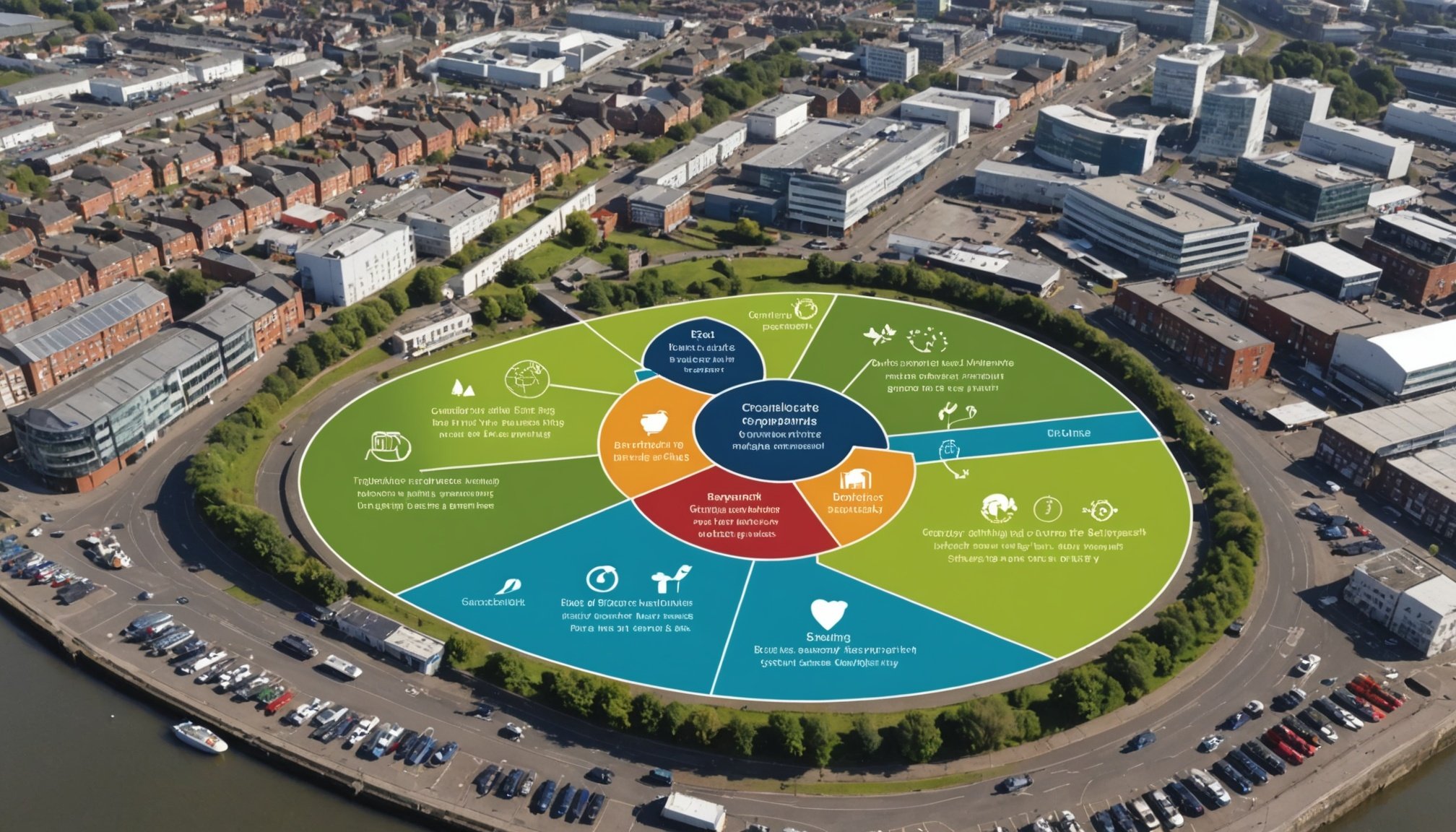Overview of Sustainable Business Models in Swansea
In the bustling city of Swansea, the sustainable business model has become a vital subject, encompassing the integration of eco-friendly practices into the day-to-day operations of enterprises. At its core, a sustainable business model prioritises three main pillars: economic viability, environmental responsibility, and social equity. Businesses following this model not only aim to reduce their carbon footprint but also strive to contribute positively to the community.
Understanding the significance of sustainability is crucial in the local context. Swansea, with its rich natural landscapes and cultural heritage, requires businesses to adopt practices that safeguard local resources while supporting economic growth. This approach leads to long-term benefits for the environment and society and ensures compliance with regulatory standards.
Also read : Key elements for developing an effective b2b marketing strategy in birmingham”s business landscape
The trends in Swansea enterprises reflect an increasing shift towards sustainability. Many businesses are embracing renewable energy sources, waste reduction strategies, and ethically sourced materials. These innovations are not just limited to a particular industry but have been observed across various sectors, including retail, hospitality, and manufacturing. Additionally, local enterprises are forming partnerships with governmental bodies and green organisations to promote sustainable practices. This collaboration provides a more comprehensive approach to mitigating environmental impact while fostering economic resilience.
Regulatory Framework for Eco-Friendly Enterprises
Navigating the local regulations and sustainability compliance requirements is crucial for the success of eco-friendly businesses in Swansea. These enterprises must adhere to a framework that encourages environmentally sound practices while aligning with Swansea business laws. Understanding this framework begins with an overview of the environmental regulations businesses must follow.
This might interest you : Ignite your brand's identity with interactive event technologies
In Swansea, businesses are required to obtain necessary permits that ensure their operations meet the expected environmental standards. This might involve assessments leading to permits related to waste management, emissions, and resource consumption. Understanding the requirements and engaging in routine sustainability compliance checks are fundamental for maintaining these permits.
Adapting to Swansea business laws, companies need to implement robust strategies that effectively incorporate sustainability into their operations. This includes reducing the carbon footprint, conserving energy resources, and adhering to waste disposal norms. These eco-friendly endeavours not only foster regulatory compliance but enhance the brand’s reputation.
For businesses keen on staying ahead, accessing resources that keep them updated on regulatory changes is vital. Authorities and local councils offer guidelines and updates, ensuring enterprises are well-informed. Moreover, subscribing to industry newsletters or participating in workshops are practical ways to remain informed about evolving environmental regulations.
Strategies for Implementing Sustainability Initiatives
Implementing sustainability strategies within business operations is pivotal in promoting eco-friendly practices. Such approaches not only protect the environment but also enhance operational efficiency.
Resource Efficiency
Incorporating resource efficiency can significantly reduce waste and energy consumption. Embracing renewable energy sources such as solar or wind power slashes reliance on fossil fuels. A circular economy approach is also beneficial; it involves recycling resources within business operations to minimize waste. These methods can lead to substantial cost savings and a lower carbon footprint.
Sustainable Supply Chain Management
Emphasizing sustainable supply chain management is crucial. Sourcing from local and eco-friendly materials cuts down transportation emissions. Forming partnerships with sustainable vendors helps in adhering to eco-friendly practices. Furthermore, evaluating suppliers based on sustainability criteria ensures consistency and accountability in the supply chain.
Employee Engagement and Training
Engaging and training employees in sustainability practices is essential. Offering regular training can foster a culture of sustainability among staff. Companies can incentivize employees through rewards or recognition programs to promote active participation in eco-friendly initiatives. By embedding these values within the workforce, businesses can ensure long-term, sustainable impacts.
Case Studies of Successful Eco-Friendly Businesses in Swansea
Swansea is home to several notable sustainable enterprises that have set a benchmark in eco-friendly practices. By examining these case studies, we can learn valuable lessons and insights.
First up, a local bakery stands out with its innovative approach. By using renewable energy sources and minimizing waste through composting and recycling, this bakery not only reduces its carbon footprint but also promotes a healthier environment. Their commitment serves as a model for others aspiring to implement green practices.
Moving to retail, a popular clothing shop prides itself on sourcing ethically made materials. The business ensures minimal environmental impact by upcycling clothes and offering incentives for customers who return used items. This creative strategy exemplifies how retail can adapt to eco-friendly standards while maintaining profitability.
Lastly, a small tech firm in Swansea has integrated sustainable operations by optimizing energy usage and promoting a paperless environment. They faced challenges, such as the initial costs of going green, but overcame them through calculated resource allocation and clever business adjustments. The lessons from these successful businesses reveal that adopting sustainability is possible and beneficial across various sectors.
These examples highlight the diverse ways Swansea businesses address environmental challenges while thriving economically, inspiring other enterprises to explore eco-friendly solutions.
Community Engagement and Collaboration
In today’s world, community involvement plays a crucial role in advancing sustainability efforts. When local communities actively participate in sustainable initiatives, they foster a collective sense of responsibility and empowerment. By harnessing the power of community support, these initiatives gain momentum, leading to more impactful and long-lasting changes.
Local partnerships often act as a catalyst in mobilizing communities towards eco-friendly initiatives. A successful example is when municipalities collaborate with local businesses and non-profits to promote recycling programs or green energy projects. These partnerships not only enhance resource pooling but also increase awareness and encourage participation from the community members, strengthening the overall sustainability efforts.
There are several strategies for effectively engaging with the community in support of sustainable initiatives. One effective approach is organizing workshops and educational seminars to raise awareness and provide practical solutions. Another strategy involves actively seeking feedback from community members, ensuring that their voices are heard and their concerns addressed. Additionally, using local media and social platforms to share success stories and progress updates can inspire others and create a sense of accomplishment among participants.
Incorporating these strategies can significantly enhance community involvement, providing a robust foundation for sustainable development and positive environmental change.
Tools and Resources for Measuring Sustainability Impact
Understanding and evaluating sustainability measurements is crucial for any organisation aiming to minimise environmental impact. Tools for assessing sustainability performance often include software platforms that provide comprehensive impact assessments. These platforms collect and analyse data to generate eco-friendly metrics. Key performance indicators (KPIs) frequently used in these evaluations include energy efficiency, waste reduction, and carbon footprint, allowing organisations to track their progress towards sustainable goals effectively.
Eco-friendly metrics are essential for creating a baseline from which improvements can be made. By focusing on these metrics, organisations can ensure their sustainability efforts are measurable and actionable. KPIs serve as benchmarks to gauge the effectiveness of implemented practices and guide organisations towards more sustainable methodologies.
Several resources are available for facilitating continuous improvement in sustainability efforts. These include training programmes, industry guidelines, and digital tools that offer insights into best practices. By leveraging these resources, organisations can stay updated with the latest trends and methodologies, ensuring their sustainability measurements remain accurate and relevant.
Ultimately, by utilising these tools and resources, any organisation can make informed decisions and foster a culture of sustainability that not only complies with regulatory requirements but also genuinely contributes to environmental stewardship.











